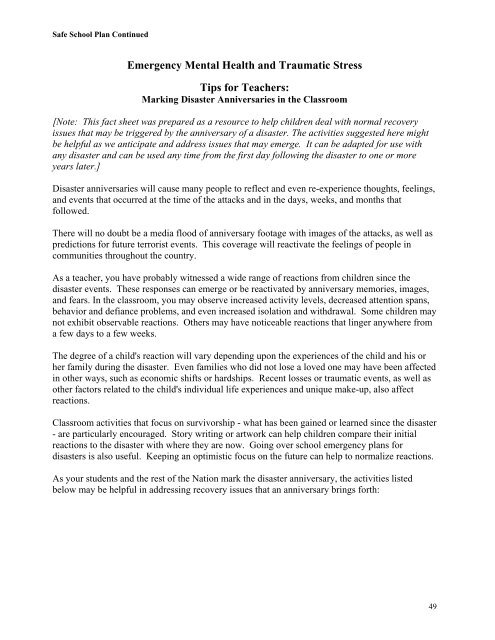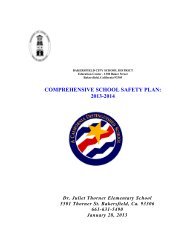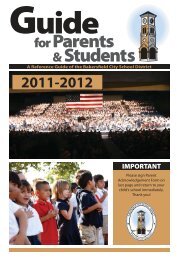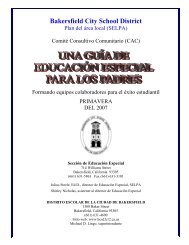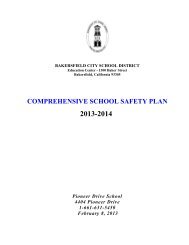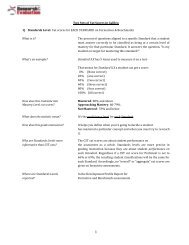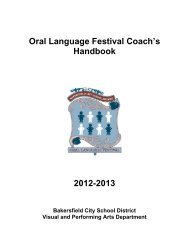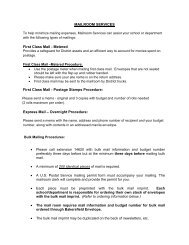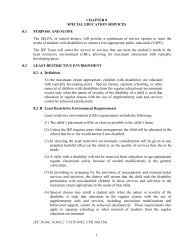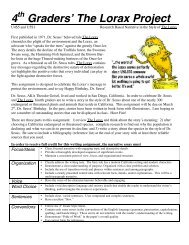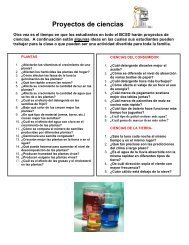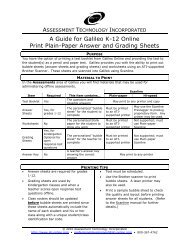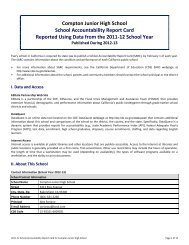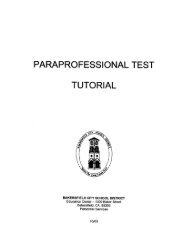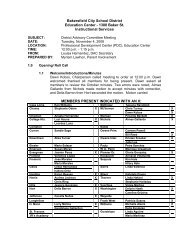EisslerSafetyPlan201.. - BCSD Static Server - Bakersfield City ...
EisslerSafetyPlan201.. - BCSD Static Server - Bakersfield City ...
EisslerSafetyPlan201.. - BCSD Static Server - Bakersfield City ...
Create successful ePaper yourself
Turn your PDF publications into a flip-book with our unique Google optimized e-Paper software.
Safe School Plan Continued<br />
Emergency Mental Health and Traumatic Stress<br />
Tips for Teachers:<br />
Marking Disaster Anniversaries in the Classroom<br />
[Note: This fact sheet was prepared as a resource to help children deal with normal recovery<br />
issues that may be triggered by the anniversary of a disaster. The activities suggested here might<br />
be helpful as we anticipate and address issues that may emerge. It can be adapted for use with<br />
any disaster and can be used any time from the first day following the disaster to one or more<br />
years later.]<br />
Disaster anniversaries will cause many people to reflect and even re-experience thoughts, feelings,<br />
and events that occurred at the time of the attacks and in the days, weeks, and months that<br />
followed.<br />
There will no doubt be a media flood of anniversary footage with images of the attacks, as well as<br />
predictions for future terrorist events. This coverage will reactivate the feelings of people in<br />
communities throughout the country.<br />
As a teacher, you have probably witnessed a wide range of reactions from children since the<br />
disaster events. These responses can emerge or be reactivated by anniversary memories, images,<br />
and fears. In the classroom, you may observe increased activity levels, decreased attention spans,<br />
behavior and defiance problems, and even increased isolation and withdrawal. Some children may<br />
not exhibit observable reactions. Others may have noticeable reactions that linger anywhere from<br />
a few days to a few weeks.<br />
The degree of a child's reaction will vary depending upon the experiences of the child and his or<br />
her family during the disaster. Even families who did not lose a loved one may have been affected<br />
in other ways, such as economic shifts or hardships. Recent losses or traumatic events, as well as<br />
other factors related to the child's individual life experiences and unique make-up, also affect<br />
reactions.<br />
Classroom activities that focus on survivorship - what has been gained or learned since the disaster<br />
- are particularly encouraged. Story writing or artwork can help children compare their initial<br />
reactions to the disaster with where they are now. Going over school emergency plans for<br />
disasters is also useful. Keeping an optimistic focus on the future can help to normalize reactions.<br />
As your students and the rest of the Nation mark the disaster anniversary, the activities listed<br />
below may be helpful in addressing recovery issues that an anniversary brings forth:<br />
49


